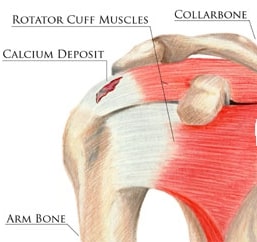When a calcium deposit builds up in the tendons of the rotator cuff a strong inflammatory reaction can cause severe shoulder pain.
It affects the function of the shoulder and can also result in impingement between the rotator cuff tendon and the acromion. The cause of calcific tendinitis is not known. Females, people aged between 30-60 years of age and diabetics are at higher risk. The deposit eventually disappears but the process can take many years. A plain Xray, ultrasound or MRI will show the size of the deposit. In the acute stage painkillers, anti-inflammatory medication and a cortisone injection may help in reducing symptoms but it is not unusual that these modalities do not work that well. Barbotage has been advocated as a feasible alternative: saline solution is injected under ultrasound and the calcium is sucked out with a syringe. Alternatively keyhole surgery debriding the calcium deposit is required if the pain is severe with pain at night which cannot be controlled with conservative methods
